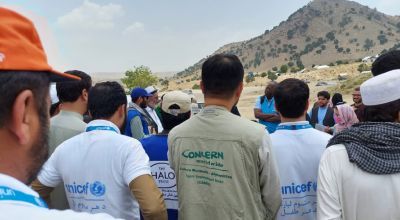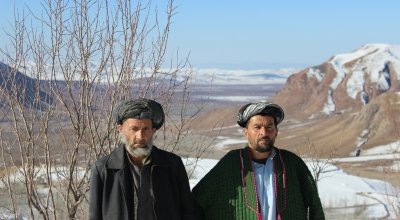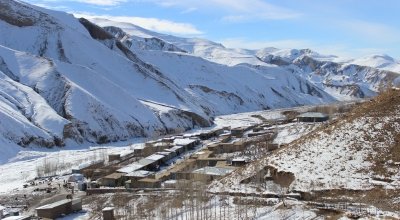
Read our 2023 annual report

Knowledge Hub
Breaking the cycle of debt in Afghanistan

In the second in this series, a Concern staff member documents his visit to the remote village of Shah Dara in north-east Afghanistan. There, he meets 64-year-old Farid* who has started a modest cafe business with the support of Concern.
Pure subsistence living
Shah Dara village has a busy market but behind the bustle, there are many people living in poverty. There are no decent roads, no access to farm technologies and many of the residents struggle to earn an income and face regular food shortages. The most vulnerable people cope by taking out loans every year during the lean season and then spend the harvest working to pay them off. If they are lucky, they might have some extra cash after repaying their loans but for the most part, it is pure subsistence living. For them it is endless cycles of going under, recovering, and going under again.
This is an area highly exposed to the elements. During the winter and spring it is very difficult to reach the district centre other than by foot or by donkey. Flooding and landslides are common and result in livestock and agricultural land getting washed away. After a flood, villagers struggle to rebuild their lives as they have no money to recoup their losses. At these times in particular, they rely on the support of the government or NGOs like Concern.
Farid's story
It is here in Shah Dara that I meet Farid*. At 64 years old, he has already exceeded Afghanistan’s average life expectancy of 59. Like most elderly people here, he has a storied face evidencing many hard years and eyes that highlight the struggles he has seen.
Life in Afghanistan for the majority of people is difficult but for the poor it is extremely difficult."
When we meet, he is chopping meat in an eatery he shares with two others, hoping for some customers. It would be misleading to call his business a restaurant as the image that might conjure up in your mind is far from the reality. To enter the cafe customers walk through a muddy yard with donkeys into a very basic, bare room and sit on cushions laid out along the walls. The kitchen, the dining room and the storeroom are one. When we called by, Farid offered us tea – here in Afghanistan, sharing tea is part custom, part hospitality and part addiction. Farid is warm, welcoming and friendly, and although busy, he generously gives up his time to chat with our group.
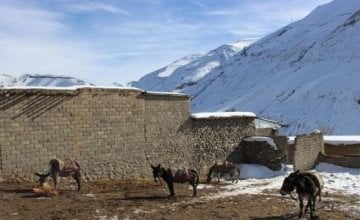
When we called by, Farid offered us tea – here in Afghanistan, sharing tea is part custom, part hospitality and part addiction."
In Farid’s home, there are twelve mouths to feed – his wife, daughters, daughters-in-law, sons and grandchildren. After a flood in 2015 he lost his two cows and a jerib of land. The residents of Shah Dara lost 40 farm animals and 50 jeribs of land in that flood. Farid is philosophical: “What’s gone is gone, there is no recovery,” he says.
After that flood, Farid joined a Concern livelihoods initiative. Our team provided Farid with 40 kg of wheat seeds, 35 kg of flax seeds, fencing, poles and cement and Farid used the materials to build a demonstration plot. In 2016, 490kg of wheat was harvested and 210kg of flax.
Breaking the cycle of debt
Prior to joining the programme, Farid was one of the villagers forced to take loans, this year he has enough wheat to feed his family and sell can sell the surplus. He also has enough flax to produce oil and animal fodder to sell at the market. He saved some of the flax seeds to sow this year, however, he could not afford to keep any wheat seeds to sow next season, he tells us. Farid also received 150 poplar saplings. These will reach maturity in approximately three years when they can be used for construction or to sell on.
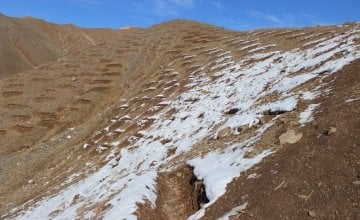
Before Farid joined the Concern project, he used to travel to another district to find work during the harvest and it took him one full day to walk there. Last year he was asking for loans to help buy food during the hunger gaps. Now, with the money he made from selling his wheat and flax, he has joined two others in opening this very simple eating house for market goers. His life is still one of subsistence, he has no savings and two of his sons have just emigrated to Iran for work.
However, he is now able to feed his family and he doesn’t have to take loans. This means that he does not have to leave his home and walk for a day to get work and pay back loans. While life is still difficult for Farid, he tells me that he is very appreciative of Concern’s work and is very happy with what he now has.
*Name changed for security purposes.
Visit our news section next week to read about the journey to Rustaq district which was hit by a devastating earthquake in the late 1990s.



